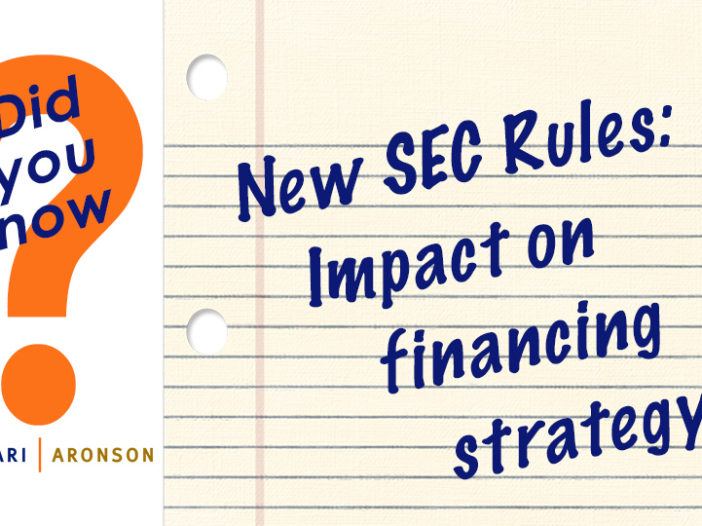
Did you know…
New SEC rules may expand private capital formation?
by Zachary Fountas
New SEC rules touch on a variety of private offerings and certain changes could have significant impacts on entrepreneurs and their financing strategies.[1]
Finding investors!: Mostly, federal private offering exemptions either outright prohibit or painstakingly regulate the use of general solicitation of investors. One situation that has been problematic for early-stage companies are demo days, when the company displays its product or vision to interested attendees hoping to attract interest. However, the details included in the demo, the statements made the day of, and the type of offering pursued after such an event, all impacted whether such a demo day presentation would fall under general solicitation and bar certain exemptions or require such burdensome disclosures to make other exemptions impractical.
Changes: One change is the new Rule 148 which deems demo days that are sponsored by colleges and universities, other higher learning institutions, state/local governments, nonprofits, incubators, accelerators and angel investor groups, would not constitute general solicitation.
This should be a welcome relief to most as the number of startups that pass through an accelerator or incubator has skyrocketed in the past few years.
Federal exemptions for offerings done close in time: Integration is the idea that an issuer’s multiple securities offerings should in fact be considered one larger securities offering. If multiple offerings are “integrated” each such offering must comply with the securities regulations and exemption rules that the other offerings were relying upon, otherwise the issuer will NOT have the necessary legal exemptions and investors may have the right to sue the issuer for rescission (the right to recoup their investment and often penalties). Prior to the new framework the SEC used a 5-factor balancing test to determine if offerings were subject to integration.
Changes: To provide issuers with bright line rules on when offerings will not be integrated, the SEC has established four non-exclusive safe harbors under Rule 152(b). Offerings will not be integrated under the following circumstances:
- If the first offering is made 30 days prior to commencing a subsequent offering, or if the prior offering has terminated at least 30 days prior to the subsequent offering; or
- If one of the offerings is made in compliance with Rule 701 (the most relied upon exemption for the issuance of restricted stock and options to employees, consultants, and advisors), Regulation S, or pursuant to an issuer’s employee benefit plan; or
- If an offer or sale made subsequent to any terminated or completed offering is made and it relies on an exemption that allows for the issuer to use general solicitation ; or
- If an offering pursuant to which a registration statement will be filed is made after: (a) a completed or terminated offering that does not permit general solicitation, (b) a completed or terminated offering that does allow general solicitation and such offering was made only to qualified institutional buyers and institutional accredited investors, or (c) a completed or terminated offering that permitted general solicitation ended at least 30 days prior to beginning the offering that will utilize a registration statement.
We expect that the SEC will have much more to say on small business capital formation issues in the days and months ahead. For now, the new guidance from the SEC provides some important clarity for entrepreneurs on mapping out a financing strategy—for which investors and when—in 2021!
[1] The above should not be considered legal advice and readers are encouraged to consult legal and accounting advisors of their own choosing for more information on the above topic.




